- Home
- Leslie Meier
Chocolate Covered Murder Page 4
Chocolate Covered Murder Read online
Page 4
“Whatcha got there?” inquired Phyllis, pointing to the blue-and-yellow box.
“A small fortune in chocolate,” said Lucy. “Want to try a Lovely Lavender, or a Mucho Macho?”
Ted was already opening the box. “Mucho Macho?”
“Beef jerky and some sort of potato.”
Phyllis was studying the array of chocolates in their gold foil compartments, trying to match them to the pictures on the inside of the box top. “Pretty small if you ask me. I like something to chew on. A mouthful.”
Lucy shrugged. “I’m on a diet.”
“That one,” Phyllis told Ted, pointing with a finger tipped in Midnite Blue, “is Mucho Macho.”
“Here goes,” he said, popping it in his mouth.
The two women watched closely to gauge his reaction.
“It’s different,” he said, after swallowing. “Okay. I’m not rushing over there to buy a box.”
“Good thing, ’cause this box costs something like sixty bucks.”
“Sixty bucks!” Ted was running his tongue around his mouth, trying to extract every bit of expensive flavor.
“Five bucks a pop. Trey says it’s an affordable luxury.”
“I’ve got to try one,” said Phyllis, picking a chocolate with a bit of crystallized violet on top. “I’m going for Purple Passion.” She popped it between her coral lips and closed her eyes, concentrating.
Lucy watched, amused, as Phyllis sucked and rolled the chocolate around in her mouth before swallowing and opening her eyes. “Well?” she asked.
“I guess I’m not a goor-met,” admitted Phyllis, pronouncing the final t. “I like Fern’s Famous dark chocolate with walnuts a lot better. And you can get a half-pound for six bucks—that’s what I call affordable luxury.”
Leaving the chocolates on Phyllis’s counter, Lucy went to her desk and started fiddling with USB cables so she could upload the photos. “How long do you want this story?” she asked.
“I’ve only got room for ten inches—and don’t forget to mention Fern’s Famous,” said Ted. The fax went into action and he stood over it, pulling out the sheets of paper as they appeared. “It’s the ME’s report,” he said.
Lucy’s hand was on the mouse but she paused, finger poised. “What does it say?”
Ted was scanning the tightly packed medical jargon, looking for something he understood. “Ah, here, conclusion. Death due to drowning, indicated by presence of water in the lungs. Contributing factors: high blood alcohol level and cranial bruising ...”
“A blow to the head?” asked Lucy.
“Yeah, but the ME points out that there is no way of determining if the injury was the result of an attack by person or persons unknown or an accident.”
All three fell silent, imagining Max Fraser’s final moments. “I hope he went quickly, didn’t feel any pain,” said Phyllis.
“That’s likely, considering his blood alcohol level,” said Ted, “and the knock on his head.”
“There’s always at least one tragedy every winter,” said Phyllis. “I hope this is the only one.”
Lucy nodded. It was true. Winter brought its own seasonal perils: people fell through the ice on frozen ponds, cars crashed on slippery roads, houses burned down due to the improper use of electric heaters, furnaces backed up and entire families died in their sleep of carbon monoxide poisoning. You tried to be careful, but accidents happened. That was life. Now, even though the image filling her computer screen was of Tamzin and Trey in the chocolate shop, she wasn’t seeing them. She was seeing Max Fraser’s ice-crusted face and that glittering silver lure dangling from his blue lips. An accident? She didn’t think so, although the police certainly would. She was beginning to think Max’s death was the work of a killer with a warped sense of humor. And it was up to her, she realized, to make sure the killer was caught. Max had helped her and she’d promised to return the favor. It was a promise she meant to keep.
Chapter Four
“Just black coffee for me,” said Lucy.
Norine, the waitress at Jake’s Donut Shop, crossed out the notation she’d started writing on her order pad. “No hash and two eggs sunnyside up with whole wheat toast?”
Lucy shook her head, mourning the loss of her usual Thursday morning feast. “I’m on a diet.”
“And about time, too,” said Sue, with a prim nod.
“Nonsense. You look great and breakfast is the most important meal of the day,” urged Rachel Goodman, a firm believer in the benefits of three meals a day. “I’ll have a cranberry muffin.”
Norine was way ahead of her. “Two black coffees, two regular coffees, one cranberry muffin, and one crunchy yogurt. That about it?”
“That’s it,” said Pam Stillings, Ted’s wife, who was a bit of a health nut and always had the yogurt topped with granola. She turned to Lucy. “Rachel’s right. If you starve yourself, your metabolism shuts down and it takes longer to lose. Look at Sue.” She smiled at the fourth member of the group, Sue Finch. “How do you think she survives on nothing but black coffee and red wine? She’s got no metabolism at all.”
“And if you ask me, the lack of nutrition is making her rather mean,” said Rachel, unusually critical this morning.
“I eat.” Sue tucked a lock of midnight black hair behind one ear. “I’ve found the perfect balance and I maintain it.” She took a sip of coffee. “I simply don’t see the point of eating calories I don’t like, so I skip breakfast in favor of a glass of wine with dinner.”
“More than one glass,” sniffed Rachel. She’d majored in psychology at college, with a focus on addictive personalities.
“I had a cup of yogurt at home,” said Lucy, sounding like a child announcing she’d tidied her room.
“Good girl.” Pam nodded her approval and changed the subject, reporting on her work as a member of the Chamber of Commerce’s publicity committee. “It looks like the Love Is Best on the Coast promo is really taking off.” She paused, as Norine distributed the mismatched mugs that were a tradition at Jake’s and filled them with coffee. “A lot of businesses are signing up.”
“I suppose it’s worth doing,” said Lucy, in a doubtful tone. She was looking out the window at the frozen harbor and the parking lot littered with shrouded boats beneath a milk-white sky. Snow was falling but it wasn’t serious, just what the TV weathermen called ‘ocean effect. ’ It was funny, she thought, how you got to recognize different kinds of snow after you’d lived in Maine for a while. “I can’t see why anybody would leave the comfort of hearth and home and spend a lot of money for this.” She waved an arm at the bleak view, almost completely devoid of color.
“Are you kidding? Maine is beautiful in winter,” declared Pam, as Norine set her bowl of granola-topped yogurt in front of her.
“I guess you’ve never been to the Bahamas,” said Norine, sending a plate with a muffin sliding across the table to Rachel. “It’s better in the Bahamas.”
“No, no, no.” Pam picked up her spoon. “It’s best on the coast.”
“You’ve been listening to Corney,” said Lucy.
“That woman is trouble,” said Sue, twisting her glossed lips into a scowl. “Somehow she convinced me to organize a Valentine dessert contest.” She took a sip of coffee. “I’m counting on you all to enter.”
“I’m awfully busy with the committee,” said Pam. “I don’t see how I’ll have the time.”
“Me, too,” said Rachel, using her tongue to whisk a muffin crumb from her lip. “The Harbor Players are putting on A. R. Gurney’s Love Letters and I’m directing.”
“That’s a first for you,” crowed Lucy. “Congratulations.”
“Yeah, I’m really enjoying it,” said Rachel. “But the rehearsals are very time-consuming.”
“That leaves you,” said Sue, narrowing her eyes and pointing a perfectly manicured finger at Lucy.
Lucy shook her head. “I told you. I’m on a diet.”
“You don’t have to eat it,” said Sue. “You just have
to make it.”
Lucy switched to Plan B. “I guess Sara and Zoe can whip something up.” She drained her mug and signaled for a refill. “I bumped into Barney Culpepper the other day. He said Eddie’s coming home. Permanently. He’s done with the marines.”
“That is a relief—now I won’t have to worry about him.” Rachel let out a big sigh. “They were so cute, weren’t they? Those boys: Richie and Tim, Toby and Eddie. Remember how Eddie was the catcher, at Little League? That funny squat he had, with one leg stuck straight out?”
Pam nodded, smiling nostalgically. “They were so cute in those Cub Scout uniforms. Remember, Lucy?”
“I wish I could forget,” said Lucy. “I was the den mother. They led me a merry chase. Those boys were a handful.”
“They all turned out fine, though,” said Pam. “My Tim’s helping to rebuild New Orleans, Richie’s going to make a big archaeological discovery... .”
Rachel smiled at the reference to her son. “We’ll see.”
“Oh, yes he is,” said Pam. “Toby’s a fine father... .”
“And someday he’ll actually get that college degree,” said Lucy, fretting about her son.
“He’ll be a captain of industry,” said Rachel. “And Eddie.” She paused, thinking, while Norine refilled their mugs. “Do you think he’ll become a cop like his dad?”
Lucy bit her lip. “You know, I think he may need some time to figure out what he wants to do. I said the town would probably have a welcome home parade and Barney said he doesn’t want a fuss.”
Rachel’s face clouded. “Oh, dear. I hope he doesn’t have post-traumatic stress syndrome like so many returning vets.”
“And I hope he gets started on something pretty quick,” said Sue. “It’s no good for these kids to hang around aimlessly. Before you know it, they’re in the court report for drunk driving or drugs.”
“I know,” said Lucy, with a grim nod. “We got one at the paper yesterday and I had to format it. I was shocked at the number of drug cases.”
Rachel shook her head. “It’s an epidemic.”
“Where does it all come from?” asked Sue.
“That’s a good question,” said Lucy, checking her watch. “Gosh, I can’t believe the time. It’s back to the salt mines for me. I’ve got a budget meeting at ten.”
The ten o’clock news budget meeting had been Ted’s idea and Lucy didn’t like it much. Deadline was noon Wednesday and the paper came out on Thursday mornings, which meant she used to have all of Wednesday afternoon and Thursday morning free. It was valuable time she used to catch up with her friends and polish off some errands. But Ted had come back from a recent productivity seminar full of ideas, one of which was the budget meeting. Lucy thought the meeting was actually counterproductive—she’d often gathered valuable news tips as she went about town with her list of errands, crossing off grocery shopping at the IGA, vacuum cleaner bags at the hardware store, wine at the liquor store, and mailing bills at the post office. Ted didn’t see it that way, however, and now she had to come in at ten instead of twelve-thirty on Thursdays. She didn’t even pick up any extra pay; in fact, her salary didn’t begin to cover the time she actually worked because she often stayed late at the office on the days the girls had after-school activities and needed a ride home.
The new system had only been in place for a couple of weeks and Lucy wasn’t in a good mood when she got to the office. Ted, however, was bursting with ideas.
“Good, you’re here,” he announced, turning his desk chair around so it faced the room and pulling over two more chairs to form a circle. “We can get started. Phyllis, that means you, too. Put the phone on voice mail, please.”
Giving him an evil look, Phyllis punched a few buttons before pushing her chair back and getting to her feet. She hated leaving her comfortable area behind the reception counter, where her chair was just right and items like her enormous pump bottle of Jergens lotion and a big box of tissues were at hand, along with a photo of her husband. She perched uneasily on the chair Ted indicated, then shoved it aside and went back to her desk, wheeling her preferred chair across the office and seating herself.
Lucy was already in place, wrestling with the problem of Sara’s job at Fern’s Famous, which meant she would need a ride home at five-thirty.
“Let’s begin,” said Ted, rubbing his hands together. “Lucy, you have the usual selectmen’s meeting. I’ll take the school committee and the conservation committee, that should be a hot one because of the proposed toilets at the town beach.”
“About time,” said Phyllis. “Those Porta-Potties stink.”
“APTC wants those ecological earth closets, composting toilets,” said Ted. “They’re up in arms over a septic system so close to the cove.”
“That’s not news,” said Lucy, who knew the letters stood for the Association for the Preservation of Tinker’s Cove. “They’re always up in arms.”
“I’ll follow up on the Max Fraser investigation,” said Ted, consulting his notebook.
Lucy started to protest but he brushed her objections aside. “I’ve got something else in mind for you, Lucy.” He turned to Phyllis. “You handle the events calendar. Is there anything I should be aware of?”
Phyllis gave him a look. “How the heck am I supposed to know? It’s only Thursday, I haven’t even started.”
“Oh.” Ted looked disconcerted. “When you file the press releases, don’t you read them?”
Phyllis sighed. “No. I don’t have time. I scan them for the date, that’s all. So I can file them.”
“Well, in the future, perhaps you could just look them over and make copies for me of the important ones,” suggested Ted.
Phyllis heaved her bust, a gesture that usually boded trouble, and Lucy pressed her lips together, trying not to smile. “I told you. I don’t have time to read them or decide which is important. How do I know, anyway? Is a bake sale important? What about a roast beef dinner at the VFW? How do I decide?”
Ted wasn’t about to give up. “Well, a production by the Harbor Players would be more important than a bake sale, for example.”
Phyllis smiled in triumph. She knew she had him. “Just you try explaining that to the Junior Women’s Club. They think their annual bake sale should be a first-page story.”
“Right,” said Ted, studying his list. “Moving along, we’re going to do a special supplement for the Love Is Best on the Coast weekend. There will be special rates for advertisers, an events calendar, and a story. That’s where you come in, Lucy. I want a big feature on a couple, an older couple, who’ve made love last. Don’t be afraid to pull out all the stops—I want this to be over-the-top romantic.”
“Like one of the fiftieth-anniversary couples?” They often ran stories about such couples, usually accompanied by then and now photos. “The Crabtrees were in the paper last week.”
Phyllis was chuckling. “You mean the Crabby-trees? They were duking it out at the Quik-Stop the other day.”
“Definitely not the Crabtrees,” said Ted. “We want a cute, loving couple, not the Bickersons. Maybe even an old couple who fell for each other years ago but married other people, but then their spouses died and they found each other again. They reconnected.” Ted was beaming, he really liked this idea.
Lucy didn’t. “How in heck am I supposed to find this adorable couple?”
Ted shrugged. “Ask around. You’ll turn up something, you always do.”
Lucy chewed her lip thoughtfully, trying to come up with a suitable couple and, much to her surprise, coming up with a few names that she scribbled down.
“That’s it, ladies,” said Ted, with a satisfied nod. “I think we made some good progress this morning.”
“Hold on,” said Lucy, remembering the conversation at Jake’s. “I’d like to do something about illegal drugs and youth. Have you seen the court report lately? There’s a big uptick. We could follow up on your interview with the governor’s wife.”
Ted shook his head.
“Trust me, Lucy. That’s too big for us. We don’t have the manpower or budget to do an investigative report like that.” Before Lucy could protest, he swiveled his chair around and reached for the phone on his desk.
Disappointed, Lucy shoved her chair under her desk and stood, tapping her fingers on the chair back. She didn’t want to write puff pieces, she wanted to tackle important issues, but she knew that Ted was struggling to keep the paper afloat. Maybe he was right to focus on promoting business, at least for now. She pulled out her chair and sat down, studying her list of loving couples.
She’d jotted down a few notes when Phyllis’s husband, Wilf, came in, holding the door for Ted, who was leaving. Wilf was the mail carrier and he set the day’s delivery, bound with a rubber band, on the counter. “Hi, sunshine,” he said, with a wink.
Phyllis blushed and smiled at her husband as if they were still honeymooners. “Hi, yourself.”
Too bad she couldn’t write about them, thought Lucy, but she knew Ted would never go for it. He’d cite journalistic ethics, conflict of interest, or something. Lucy didn’t buy it. She figured he just wanted to make her job harder.
“Hi, Wilf,” she said, glancing at her list. “You know everybody in town, right?”
“And their dirty secrets,” he said. “Only the trash haulers know more about folks than me.”
“You’re just the man I want,” declared Lucy, explaining her assignment to him. “So tell me, do you think the Wilkersons, over there on Bridge Street, would be good subjects?” The Wilkersons had recently announced their fiftieth wedding anniversary and had even renewed their vows.
“I can’t really say—people’s mail is confidential. Postal regulations.”
“How about a yes or no answer?”
“Okay. No to the Wilkersons.”
“But why? They’re so cute.”
“Like I said, I can’t elaborate. Regulations. But trust me. You don’t want to look foolish, now.”
“Okay.” Lucy crossed the Wilkersons off her list. “What about the MacDonalds? The people with the farm stand.”

 Christmas Card Murder
Christmas Card Murder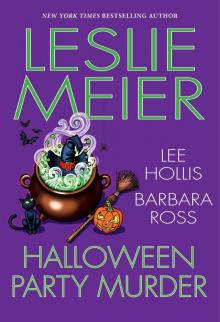 Halloween Party Murder
Halloween Party Murder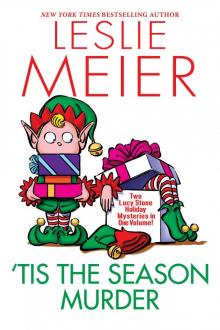 'Tis the Season Murder
'Tis the Season Murder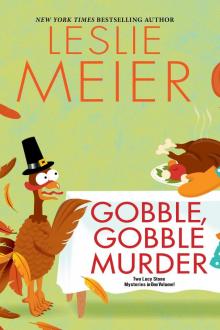 Gobble, Gobble Murder
Gobble, Gobble Murder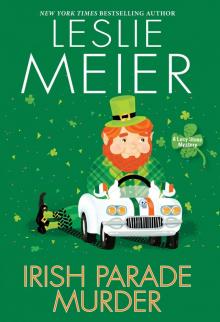 Irish Parade Murder
Irish Parade Murder Bake Sale Murder
Bake Sale Murder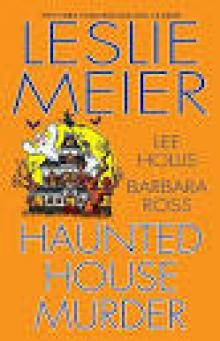 Haunted House Murder
Haunted House Murder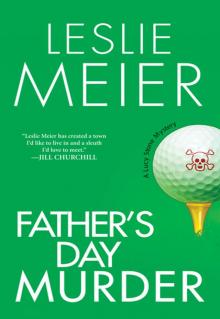 Father’s Day Murder
Father’s Day Murder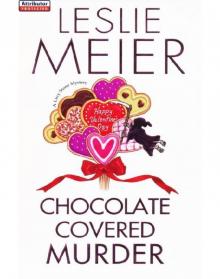 Chocolate Covered Murder
Chocolate Covered Murder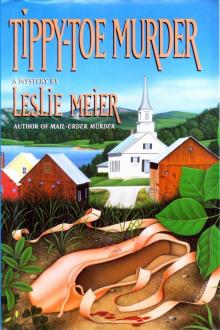 Tippy Toe Murder
Tippy Toe Murder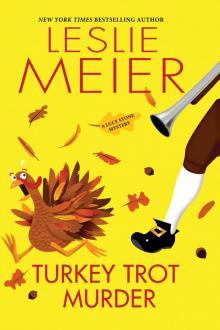 Turkey Trot Murder
Turkey Trot Murder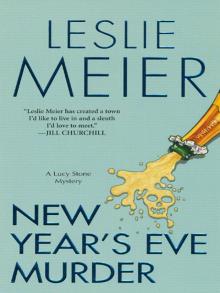 New Year's Eve Murder
New Year's Eve Murder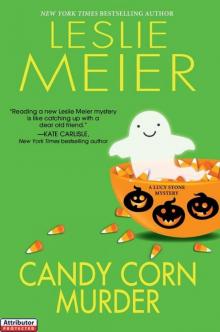 Candy Corn Murder
Candy Corn Murder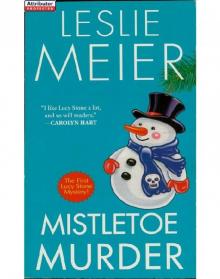 Mistletoe Murder
Mistletoe Murder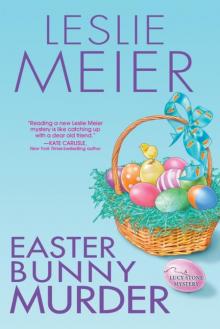 LStone 20 - Easter Bunny Murder
LStone 20 - Easter Bunny Murder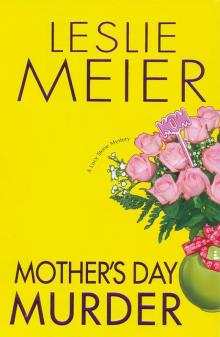 Mother's Day Murder
Mother's Day Murder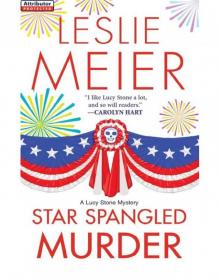 Star Spangled Murder
Star Spangled Murder Silver Anniversary Murder
Silver Anniversary Murder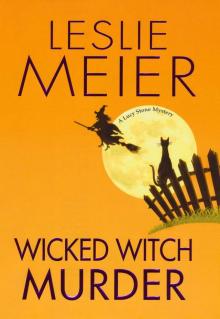 Wicked Witch Murder
Wicked Witch Murder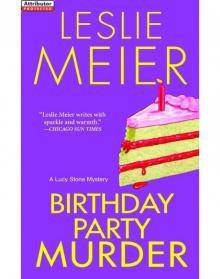 Birthday Party Murder
Birthday Party Murder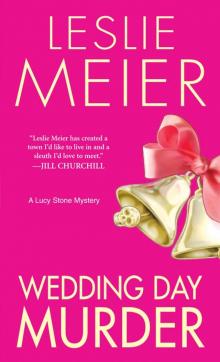 Wedding Day Murder
Wedding Day Murder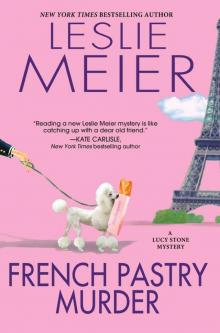 French Pastry Murder
French Pastry Murder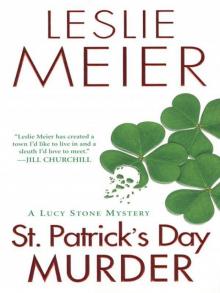 St. Patrick's Day Murder
St. Patrick's Day Murder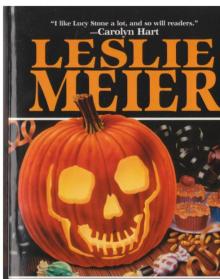 Trick or Treat Murder
Trick or Treat Murder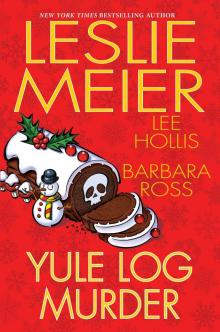 Yule Log Murder
Yule Log Murder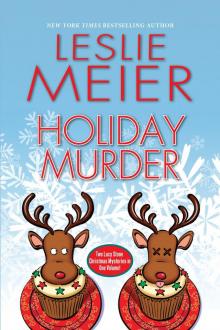 Holiday Murder
Holiday Murder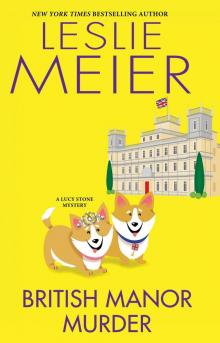 British Manor Murder
British Manor Murder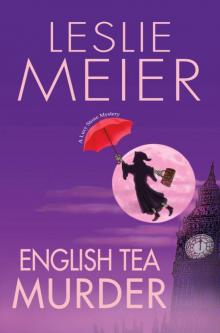 English Tea Murder
English Tea Murder